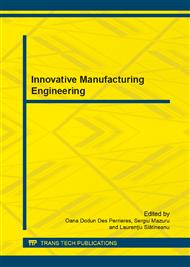p.705
p.710
p.715
p.721
p.729
p.734
p.739
p.744
p.749
Research on Improving the Assessment Process of Students' Knowledge in the Field of Materials Processing
Abstract:
The paper presents the research work carried out in order to determine the optimum assessment process in the case of an introductory engineering course, Technology of Materials. This course is taught to the students in the second year of Faculty of Engineering, specializations: Machine Building Technology and Industrial Engineering Economics. The relation between the assessment process and the students results for the last six academic years has been carefully analyzed. In the last three years the author had an innovative approach that involves the use of blogs and social media in the process of students learning. Also a significant change in the assessment process has been established. The students were encouraged to make a more active contribution in their technical training path, by preparing individual essays on topics related to advanced materials and technologies. Also their involvement in practical activities was encouraged and rewarded in the grading process. As a result the distribution of students final grades had a significant change, becoming now a Gaussian distribution.
Info:
Periodical:
Pages:
729-733
DOI:
Citation:
Online since:
August 2013
Authors:
Keywords:
Price:
Сopyright:
© 2013 Trans Tech Publications Ltd. All Rights Reserved
Share:
Citation:


